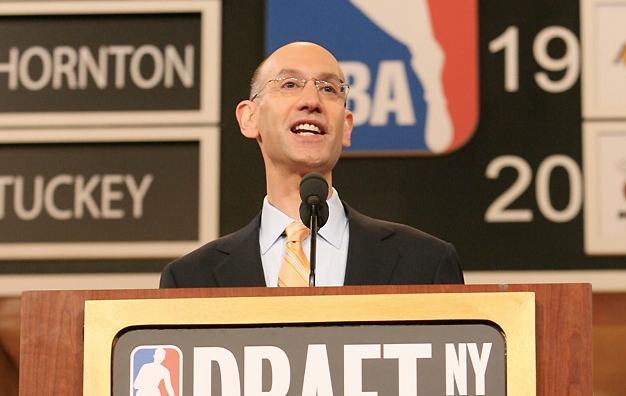This guest post is written by Jason A. Davis, Esq. a Seattle attorney and sports fan. Mr. Davis has previously contributed to the Sports Agent Blog. Follow him at @JasonDavisEsq1.

Sterling silver is an alloy containing a majority of silver and a small percentage of other metals. For the NBA, however, it is the meltdown of the longest tenured owner of a team (Donald Sterling) and the threatened disavowal by a new commissioner (Adam Silver) who is making unabashed attempts to pour the current controversy into an intentional die casting of his vision of the future NBA. This process has been as hot and dangerous as the silversmith’s art of old, and as the irons are still hot – only time will tell how this intriguing alloy of Sterling Silver will be fashioned.
At this time of year, basketball fans are usually fixated on the gold of the NBA Finals, and the coveted trophy awarded to its victor. However, attention has been partially deflected away from the gold of the trophy playoffs, to the Sterling Silver struggle. Part of the diversion and confusion is the contrast between the American expectation of law, free speech, privacy rights, ownership in private property, due process, racial equality/respect and the current Sterling Silver struggle.
Mr. Sterling is a successful businessman, former attorney, and (at the date of this publishing) owner of the Los Angeles Clippers. Mr. Sterling has owned the Clippers since 1981. His fall from grace in the public eye began by the release of a now infamous audio recording. This recording was apparently obtained secretly, without his knowledge, and during what appears to be a squabble with a vengeful mistress during a sordid affair. As the tape was heard and read around the world, Mr. Sterling’s franchise holdings melted before his eyes.
To some, this was swift justice. To others, the immediate loss of ownership rights, the chilling effect on free speech, and the speedy rush to judgment (that would give lady justice whiplash), seemed to be a breach of due process. As Americans, we enjoy the rights of ownership to our property. It cannot be taken away by the government without due process. In addition, a secret recording of our voices/conversation is illegal, in California at least. See California Penal Code section 632). The federal government must obtain a warrant for such audio surveillance. The government is also prohibited from violating our right to privacy. In addition, the First Amendment guarantees us the right to free speech. That means that no matter how ridiculous, objectionable, disturbing, appalling or bigoted the speech is – you are free to say it without the government infringement. Although there may be exceptions to these protections – these are the general rules. The government cannot punish you for your speech. Free market reaction to your speech is obviously another story. Finally, the government has worked hard to establish and protect civil rights of all Americans – no matter the color of their skin. So how then, can this owner be stripped of his ownership rights or forced to sell his team in such swift fashion?
The key lies in one factor – it’s not the government acting – it’s the NBA. The National Basketball Association is a corporate entity. It is not bound by the restraints of the United States Constitution. It is a contractual organism that owners agree to be a part of. With the power of contract comes the power to be bound. Mr. Sterling is bound by the terms of his contract with the NBA, and its constitution, bylaws and rules. This contractual obligation is a higher standard to which these owners agree to hold themselves to. Mr. Sterling’s statements exposing apparent bias, not only brought shame on him, it also allowed the commissioner to act/react as he saw fit. The “laws” that govern this situation are within the contractual realm of the NBA. These contractual rules are administered by the newly empowered commissioner – Adam Silver. Mr. Silver, another lawyer, knows the powers at his disposal and has wasted little time to address the situation.
As with three point game winning shots, timing is everything! Mr. Silver has taken over the reins of the NBA from a “Stern” predecessor, that guided the league from 1984-2014. In the instant of gaining power, Mr. Silver forged a bold path forever setting the tone of his governance. As awful as this situation has been, it was perfect timing for Mr. Silver to make an impression while the iron was hot. The processes of the NBA, again a private entity, responding to the actions of one of its owners on a very open and public scale, cannot be viewed the same as actions by the U.S. government. As long as the NBA does not itself run afoul of the law, it may conduct its internal affairs as it deems appropriate.
Therefore, other than observing the differences between Mr. Sterling’s loss of ownership in a private company, and the protections of the U.S. Constitution from parallel government actions/punishments, what can we take from this situation? The first application would be the age old wisdom of “Whatever you have said in the dark will be heard in the light, and what you have whispered behind closed doors will be shouted from the housetops for all to hear!” (Luke 12:3 NLT) Finally, I hope that Mr. Sterling has learned (albeit the hard way) this valuable lesson: choose your words carefully, and make them golden – not sterling silver!
